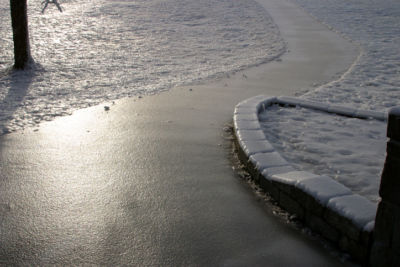


The weather has turned cold, and ice and snow are quickly becoming a daily reality for Michigan residents. Find out what you need to know about winter slip and fall accidents now, before you are faced with an injury.
Michigan premises liability law doesn't make it easy for the average customer or visitor to be compensated for personal injury caused by a slip and fall. But you can still receive damages in some cases. It depends on where the injury happened, why, and why you were there in the first place.
In deciding whether you are entitled to relief after a slip and fall injury, courts will ask why you were there. People where were invited onto the property for business purposes are entitled to more protections than those who were simply allowed to be there or who were trespassing. For example, shoppers looking for the perfect holiday gift in a store during business hours are more protected than the thief who breaks into that store after it has closed for the night.
While commercial patrons are entitled to more protections, Michigan law does not allow a person to collect damages if he or she is injured by a danger that was easily visible and obviously hazardous. When winter comes around, these "open and obvious" hazards are everywhere. A property owner has no duty to warn visitors or remove visible ice and snow from his or her property. Even black ice can be considered "visible" if there are signs of the ice nearby.
That is, unless the snow and ice is unavoidable. For example, if the only way into a business is by crossing a 10 foot expanse of slick ice, the property owner may need to take reasonable steps to make the entry way safe, such as by shoveling or laying down ice-melter.
A business may not be required to clear its sidewalk of obvious snow and ice, but landlords and governments are held to a different standard. Landlords of multi-family units are required by law to keep their premises in reasonable repair and comply with state and federal health and safety laws. This can sometimes include removing snow and ice to allow tenants and their visitors to safely come and go. Similarly, local governments have a legal obligation to keep roads and sidewalks in good repair. If a city fails to clear public roadways or sidewalks, there could be a premises liability claim when someone slips and falls on the accumulated ice.
However, even where there is a duty to keep walkways clear, the person or entity responsible still needs to know the hazard exists before having a duty to clear it. Unless someone has reported the danger or it has existed long enough the city or landlord can be assumed to know it is there, you won't be able to collect premises liability damages. For example, if it has just begun to snow when you slide on a patch of slush on a city sidewalk, you may not have a claim. But if that same slush puddle is still there days later, you may be able to collect for your injuries.
Anyone who has lived through a Michigan winter knows that it is almost impossible to keep snow and ice outside. When snow gets tracked into businesses it can create slippery floors that are not always easy to see. If a premises owner knows about water on the floors of its property but does nothing to protect its patrons, there could be a premises liability claim for that non-obvious hazard.
Michigan premises liability can be as difficult to navigate as an ice-covered walk. If you have been injured in a slip and fall accident you need an experienced personal injury attorney to help you determine whether you have a claim. At Sachs Waldman, we have extensive experience helping the victims of negligent property owners recover slip and fall damages. We can help you understand your rights after a fall. Contact our Detroit personal injury law office at 1-800-638-6722.
© 2024 Michigan Injury Attorneys
View Our Disclaimer | Privacy Policy
Detroit Personal Injury & Car Accident Attorneys